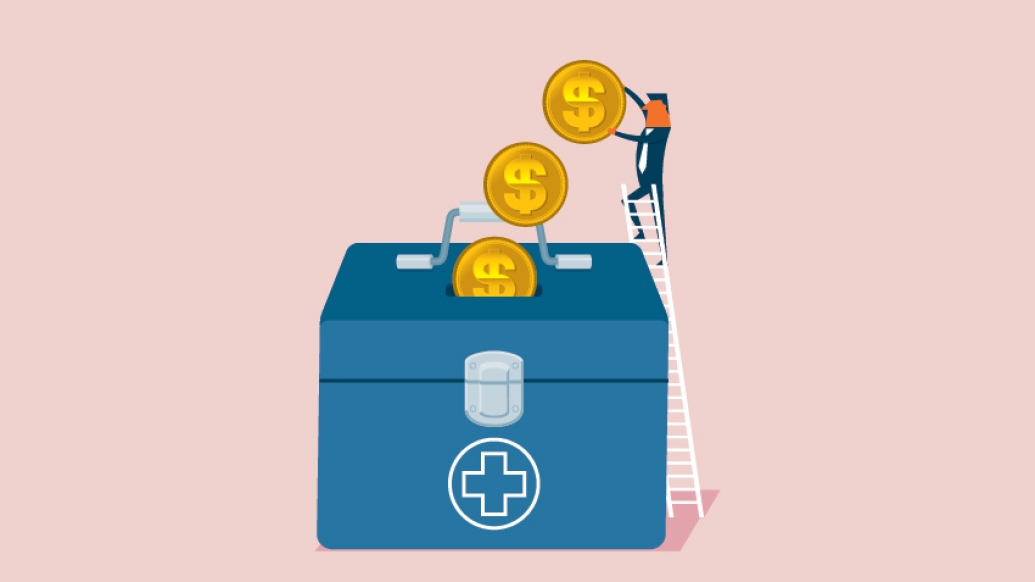Few people with HDHPs proactively ask about or search for lower-cost care. This suggests opportunity for insurers, employers and health care providers to help.
11:00 AM
Author |

More and more Americans have health insurance that requires them to open their wallets for the first few thousand dollars' worth of care they receive every year, before the insurance coverage kicks in.
MORE FROM THE LAB: Subscribe to our weekly newsletter
But a new study suggests that despite the rise in these high-deductible health plans, most Americans who have them aren't saving for health care costs, shopping around for better prices, talking to their doctors about costs or making other smart consumer moves.
And even when they do, they get help only about half the time, according to the new study published in the March issue of Health Affairs by a team from the University of Michigan Institute for Healthcare Policy and Innovation.
"Nearly half of Americans who have private health insurance are now enrolled in a high-deductible health plan (HDHP). Our previous research has shown that few Americans in these plans are saving for care, talking with providers about costs, comparing prices and quality, or trying to negotiate prices for services, even though doing so might help them get the care they need at an affordable price," says lead author Jeffrey Kullgren, M.D., M.S., MPH, an assistant professor of general internal medicine at U-M.
But, he says, "Our new study identifies promising strategies that health plans, employers, and policymakers should explore to promote more engagement in these consumer behaviors, which could ultimately help the growing number of people in HDHPs overcome the major financial challenges they face in these plans."
Kullgren took part in a Washington, D.C. event sponsored by Health Affairs, on the role of consumers in shaping the future of American health care.
Consumer-oriented plans, but not classic consumer behavior
The new study, based on a national poll of 1,637 adults under age 65 who had HDHPs for at least a year, provides new insight into the behavior of people with a type of insurance that many employers have turned to in an effort to reduce their own health care costs.
The plans, which require individuals to pay at least the first $1,330 of their own costs, and families the first $2,700, often are offered with a tax-protected health savings account to help people stash away money to pay for their future care needs.
The vast majority of the poll's participants got their HDHPs through an employer, though people can also buy such plans on the Affordable Care Act individual insurance exchanges and from insurers. Some policymakers have championed the plans as a way of giving patients "skin in the game" when it comes to their health care costs.
Given the continued growth in these plans, we have to figure out how to better help consumers.Jeffrey Kullgren, M.D., M.S., MPH
Employers often encourage people enrolling in HDHPs to put away money for when they need it, to research costs and quality ratings at different providers and health care facilities, to talk with their doctors and other providers about costs and to negotiate prices for services they need.
But the U-M researchers, who are especially interested in the effects of HDHPs on people with chronic illnesses who can expect to have regular health care needs, found that many people aren't pursuing these "consumer" behaviors. The researchers oversampled for people with chronic illnesses in the poll, so that 42 percent of respondents had at least one such condition.
Key findings from the study include:
- 58 percent of poll participants said they had a health savings account to put aside money for medical expenses, including health savings accounts.
- 40 percent of the total sample had saved any money for future medical costs, and those with HSAs were more than twice as likely to say they had done so.
- Only 25 percent had talked to a health care provider about the cost of a service. Of those who had done so, more than half said they had gotten help from someone at their doctor's office with this discussion.
- Only 14 percent had compared prices for the same service or product, or the quality ratings for different providers. Those who said on the survey that they tended to comparison shop when making a major purchase in other areas of their life were more than twice as likely as others to say they had compared healthcare prices.
- Among those who had compared prices, more than 80 percent said they had done so via a website.
- Only 6 percent had tried to negotiate the price of a health care service, either in advance or after they received a bill for a service they'd received. Those who four or more healthcare visits in the last year were much more likely to have tried this.
The new study builds on findings previously published in JAMA Internal Medicine by Kullgren and his colleagues, which showed that people were most likely to compare prices and talk to providers about the cost of prescription drugs. Just under half of those who compared prices or saved money for future health expenses said it helped them in the past year.
The role of health care providers
The researchers conclude that health care providers, insurers and employers could do more to help people in HDHPs. For instance, providers could help people in HDHPs understand their possible future medical needs so they can try to save for them.
Also, health care facilities could make prices available at the point of care so patients and providers can talk about them. And employers that offer HDHPs could offer to help employees learn how to use this information in their decision-making.
Kullgren notes that other research has shown that people in HDHPs often use less health care than people with other types of insurance — using less of the care that might be most effective for them, as well as less-effective care that they probably don't need.
He and his colleagues are studying what tools, interventions and policies can help encourage more consumer-like behavior among people in HDHPs, and what people say helps them use this form of insurance wisely.
Using research on health-related behavior and the value of particular types of care for patients with specific conditions, they hope to go beyond information and education.
"Given the continued growth in these plans, we have to figure out how to better help consumers," Kullgren says. "And if we only focus on the consumer side, we circumvent the role of doctors and other providers as an agent for the patient — we shouldn't expect patients to be their own doctors."
The study was supported by the Robert Wood Johnson Foundation.

Explore a variety of health care news & stories by visiting the Health Lab home page for more articles.

Department of Communication at Michigan Medicine
Want top health & research news weekly? Sign up for Health Lab’s newsletters today!





